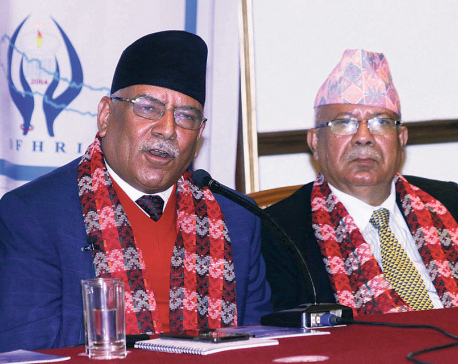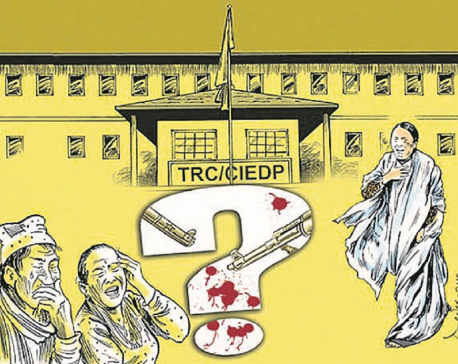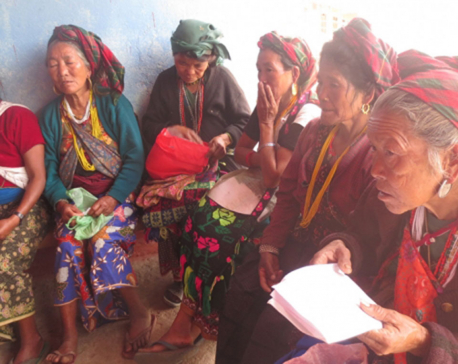
OR
HRW raps govt over failures in transitional justice, freedom of expression
Published On: January 16, 2020 07:30 AM NPT By: Republica | @RepublicaNepal
KATHMANDU, Jan 16: Human Rights Watch, a New York-based international human rights watchdog, has rapped the government led by KP Oli for failing to deliver transitional justice to conflict victims and introducing a slew of measures to curtail freedom of expression.
In its World Report 2020 released on Tuesday, HRW said although the Oli government proposed amendments to the law relating to transitional justice, they did not meet international standards that could ensure those responsible for the worst crimes committed during the conflict come to trial. “Instead, the government, like its predecessors, continued to resist amending the transitional justice legislation to abide by a landmark 2015 Supreme Court ruling,” it said.
The apex court ruling struck down key components of the current law, such as a provision that would allow amnesties even for perpetrators of war crimes and crimes against humanity.
The HRW said although the Truth and Reconciliation Commission (TRC) and the Commission of Investigation on Enforced Disappeared Persons (CIEDP) were finally established in 2015 as per the commitment made in the Comprehensive Peace Accord (CPA) in 2006, the terms of the members of both the commissions expired earlier last year. “However, neither commission had completed a single investigation before the commissioners’ mandates expired,” it further said.
Victims’ groups objected to the stalled system for appointing new commissioners, which appeared designed to ensure that selected candidates are acceptable to political leaders and the army. Victims’ groups also demanded that the transitional justice law be amended before the commissions resume work, and that they be consulted on strengthening the process, demands which the government has so far resisted, the report states.
The TRC had registered over 32,000 cases of people who remain disappeared over decade-long conflict since 1996 and the CIEDP had registered over 3,200 cases of people who remain disappeared over the last 10 years since the conflict ended. The HRW Report also said that India had failed to call for proper transitional justice in Nepal despite its role in brokering the landmark 2006 agreement between mainstream political parties and the underground Maoist rebel.
The HRW Report has also slammed the government for its attempts to curtail freedom of expression as a result of increased attacks against journalists and freedom of expression of ordinary citizens online.
“Police used Electronic Transactions Act, which is supposedly designed to address online fraud, to arrest journalists and bloggers, including those reporting on corruption, and even a comedian who upset a movie director with a negative review,” it said.
The report said that the government presented three pieces of new legislation that further seriously erode freedom of expression.
“The Media Council Bill establishes a new, government-controlled media council, with the power to impose sanctions, including fines and loss of accreditation, on journalists, editors, and publishers if, for example, they are deemed to have harmed the ‘image or prestige’ of an individual,” it said. “The new Information Technology Bill is even more draconian than the Electronic Transactions Act it replaces, creating new offences so broadly defined they could plausibly be interpreted to included much online expression, and imposing custodial penalties for those who are convicted.”
The HRW has also expressed concern over the Mass Communications Bill “that duplicates similar provisions, with further penalties, for loosely defined acts of expression.”
“The Nepali people struggled for decades to institutionalize a democratic constitutional order, and yet are now being denied their rights by the very people they had hoped would represent those values,” an HRW statement quoted South Asia director at HRW Meenakshi Ganguly as saying. “Political parties, once they are in government, are fighting tooth and nail to stifle critical voices and protect those allegedly responsible for past war crimes.”
You May Like This

Conflict victims still struggling for justice
KATHMANDU, Nov 22: While the country marks the 13th anniversary of the Comprehensive Peace Agreement (CPA), thousands of conflict victims... Read More...

Waiting for justice
Thirteen years after signing of CPA, justice eludes the conflict victims ... Read More...

TJ bodies spent Rs 460 million in four years, conflict victims still await justice
KATHMANDU, April 13: The members of two crucial transitional justice (TJ) bodies spent nearly Rs 460 million during their four... Read More...




Just In
- CM Kandel requests Finance Minister Pun to put Karnali province in priority in upcoming budget
- Australia reduces TR visa age limit and duration as it implements stricter regulations for foreign students
- Govt aims to surpass Rs 10 trillion GDP mark in next five years
- Govt appoints 77 Liaison Officers for mountain climbing management for spring season
- EC decides to permit public vehicles to operate freely on day of by-election
- Fugitive arrested after 26 years
- Indian Potash Ltd secures contract to bring 30,000 tons of urea within 107 days
- CAN adds four players to squad for T20 series against West Indies 'A'














Leave A Comment